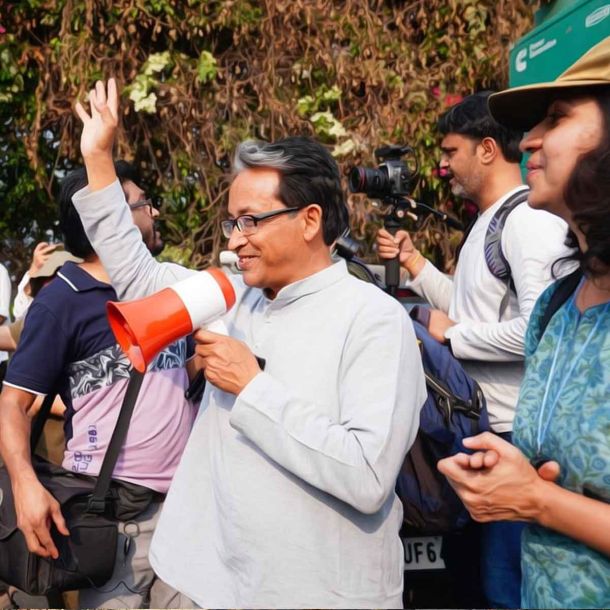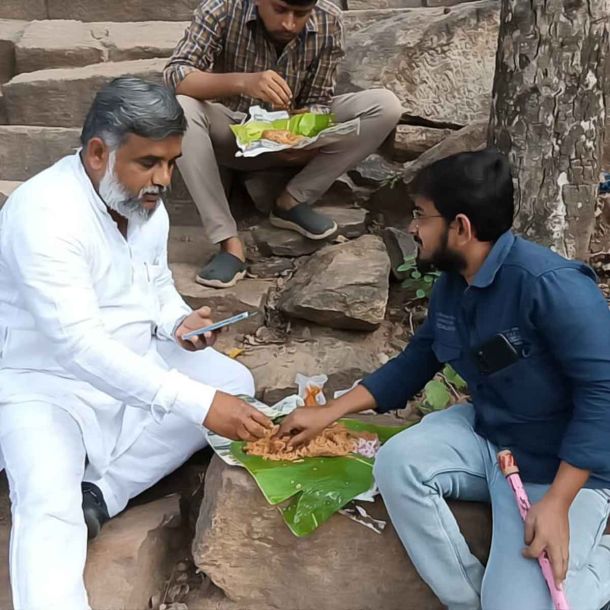MORE COVERAGE
Twitter Coverage
Satyaagrah
Written on
Satyaagrah
Written on
Satyaagrah
Written on
Satyaagrah
Written on
Satyaagrah
Written on
JOIN SATYAAGRAH SOCIAL MEDIA
Udupi - FIR against Muslim students Alimatul Shaifa, Shabanaz, & Alia for filming Hindu girls, yet bail granted, contrastingly, a BJP woman's arrest for questioning the CM on the cover-up sparks debate on fascism and appeasement in the college controversy

In a recent incident in Udupi, a city known for its temples and educational institutions, the district police have taken significant action following a disturbing violation of privacy. They have filed a First Information Report (FIR) against three Muslim students. These students are accused of secretly recording videos of Hindu girls in the restroom of Netra Jyoti College, a grave breach of privacy and trust within the educational community.
|
This case, reported by Asianet News, has brought to light two separate but interrelated issues. The first case involves the alleged filming of a student in the college restroom. This act, a serious invasion of privacy, has led to charges against three female students and members of the college administration. The involvement of the college administration is particularly concerning, as it suggests a failure to protect students' privacy and safety on campus.
The second case is related to the distribution of this illicitly obtained footage. According to the reports, a hidden camera video was uploaded on YouTube channels. This act of sharing private footage on a public platform like YouTube further compounds the seriousness of the incident. It not only violates the privacy of the individuals involved but also raises questions about the safety and security measures in place at educational institutions.
The police's decision to file two separate cases underscores the complexity of the situation. It indicates a thorough approach to addressing both the initial act of recording the videos and the subsequent distribution of the footage. This incident has likely caused significant distress to the victims and raised concerns about communal harmony in the region.
|
The involvement of students from different religious communities in the incident has added a communal dimension to the case. However, the focus remains firmly on the breach of privacy and the legal implications of such actions.
The situation in Udupi's Netrajyoti College took a disturbing turn with allegations of videos being secretly recorded in the women's washroom and then shared with specific groups. These allegations specifically claimed that topless videos of Hindu girls were being recorded and circulated among Muslim groups, raising serious concerns about privacy violations and communal tensions.
In response to these allegations, the college management initially conducted its own inquiry. They concluded that the video in question had been deleted and decided to close the case. This initial response by the college management might have been an attempt to resolve the issue internally. However, their decision to close the case did not sit well with the public.
Following the college management's decision, there was a significant public outcry. This reaction reflects the gravity of the allegations and the community's demand for justice and transparency. In response to the widespread public outrage, the Malpe Police Station in the Udupi district took a suo moto action. This means they initiated legal proceedings on their own accord, without a formal complaint being filed by the victims.
|
As a result of this action, a case was filed against three Muslim students: Alimatul Shaifa, Shabanaz, and Alia. These students are accused of being directly responsible for creating the offensive video. Additionally, the management board of Netrajyoti College is also implicated in the case, facing charges of evidence destruction. This aspect of the case suggests that there may have been attempts to cover up the incident, further complicating the matter.
The police have registered multiple cases under various sections of the Indian Penal Code. These include Section 509 (word, gesture or act intended to insult the modesty of a woman), Section 204 (destruction of evidence), Section 175 (non-compliance with a requisition for information), and Section 34 (acts done by several persons in furtherance of common intention). This range of charges indicates the multifaceted nature of the alleged offenses, encompassing both the act of recording the video and the subsequent handling of the situation.
The decision to formally register the case came amidst significant pressure from various quarters. Notably, leaders of the Bharatiya Janata Party (BJP), various Hindu organizations, and women across the state of Karnataka voiced their opposition to the handling of the incident. Their involvement signifies the case's sensitivity and its potential impact on communal harmony and women's safety.
In the wake of the alarming incident at Netrajyoti College in Udupi, where allegations surfaced about the secret recording of videos in the college's women's restroom, the National Commission for Women (NCW) has stepped in, reflecting the gravity of the situation. The state government's perceived lack of serious response to this case has prompted the NCW to take a proactive role in seeking justice and understanding the truth behind these allegations.
|
The NCW, a statutory body focused on women's rights and issues, has decided to send a team to Udupi to conduct a comprehensive investigation into the incident. This move underscores the severity of the allegations and the need for an in-depth and unbiased inquiry. The involvement of the NCW is significant, as it brings national attention to the case and ensures that the investigation is conducted with the necessary rigor and sensitivity.
Leading this crucial investigation will be Khushbu Sundar, the South India member of the National Commission for Women. Her role in this inquiry is pivotal. With her expertise and experience in dealing with women's issues, Sundar's leadership is expected to bring a focused and informed approach to the investigation. The announcement of her leading the investigation was made by Shyamala Kunder, a former member of the NCW, signifying the importance the Commission places on this case.
Meanwhile, activist Rashmi Samant has brought additional attention to the Udupi restroom secret video case. Samant's involvement draws further public and media scrutiny to the incident, highlighting the need for a thorough examination of the facts and ensuring that the victims' voices are heard.
However, there have been claims that certain media outlets and personalities are downplaying the severity of the crime. Specifically, Zubair and some leftwing media portals have been accused of not giving the incident the seriousness it deserves. This aspect of the situation reflects the complex interplay of media perspectives and biases in reporting sensitive issues. It underscores the importance of objective and balanced reporting, especially in cases that have significant social and communal implications.
Earlier this week, Rashmi Samant, a Hindu rights activist, brought further attention to the Udupi toilet secret video incident through social media. In a tweet, Samant expressed her concern over the apparent silence surrounding the incident, suggesting that there might be a concerted effort to suppress the case. She emphasized the gravity of the situation by stating, "Yet, this issue is not being condemned with the severity it deserves." This statement points to a perceived lack of appropriate response from both the public and authorities regarding the incident's seriousness.
Samant also shed light on the severe emotional impact the incident has had on the victims. She revealed, "many of the girls featured in the video were depressed and disturbed to the extent they were contemplating self-harm or suicide." This alarming revelation highlights the profound psychological trauma experienced by the victims. It underscores the need for immediate and sensitive support for these individuals, as well as a swift and serious response to the incident itself.
Drawing a parallel to a historical incident to emphasize her point, Samant wrote, "Let me remind you of what happened in Ajmer in the year 1992 where hundreds of girls were raped with the blackmail of releasing nude photos that were illegally solicited. I cannot bear to think that Udupi could have turned to another Ajmer." By referencing the Ajmer mass rape case of 1992, she illustrates the potential for such incidents to escalate into major crises if not addressed properly. The comparison serves to remind the public and authorities of the severe consequences of inaction and the importance of taking immediate steps to ensure such situations are prevented and adequately dealt with.
|
Activist Rashmi Samant Faces Police Action for Tweeting about Udupi Incident
In a significant development on 24th July, Udupi police initiated an action to locate Rashmi Samant, a Hindu human rights activist, following her vocal stance on the Udupi incident. Samant had brought attention to the case, where Hindu female students' videos were allegedly secretly recorded by girls of the Muslim community in the washrooms of a private institution. This move by the police to locate Samant comes in the wake of her tweets and public statements about the incident, which have sparked considerable attention and controversy.
Advocate Adhitya Srinivasan, representing Rashmi Samant, provided insight into the experiences of Samant's family amidst this situation. According to Srinivasan, a group of policemen visited Rashmi Samant's home at around 8 PM. At the time of this visit, Samant was not present at her residence. The police then proceeded to question her parents, inquiring repeatedly about Rashmi's whereabouts. This action by the police indicates a significant escalation in the case, suggesting that Samant's public comments and activism have drawn the attention of law enforcement.
The questioning of Samant's parents, especially in her absence, raises concerns about the freedom of speech and the right to activism. The police's actions may be perceived as intimidating, particularly for Samant's family, who found themselves in the midst of a potentially stressful situation. This development is notable because it highlights the complexities and potential consequences of speaking out on sensitive communal issues. It also underscores the role of law enforcement in such cases and the balance between investigation and the respect for individual rights.
|
Police Claimed There Was No Communal Angle
In a surprising turn of events, the Udupi police have reportedly stated that the incident at Netrajyoti College, involving the alleged recording of videos in the women's restroom, lacks a communal angle. This claim was reported by The News Minute and reiterated by India Today during a panel discussion, where Hindu rights activist Rashmi Samant was also present. Both media outlets highlighted the police's firm denial of any communal motivations behind the incident.
The Assistant Superintendent of Police (ASP) of Udupi, Siddalingappa, was quoted by The News Minute, offering a somewhat ironic reassurance. He stated, “We looked through the phone and didn’t find any such video. We thoroughly investigated the matter, and there is no evidence that the video was shared. It was a one-off incident in the college and had no communal angle to it. The purported victim doesn’t want to file a police complaint.” This statement might be seen as an attempt to downplay the incident, painting it as an isolated event rather than part of a larger, more troubling pattern.
This assertion by the police could be perceived as a bit careless, considering the uproar and the severe allegations made in connection with the case. It almost sounds as if the police, after a seemingly cursory glance at a phone, have wrapped up what could be a complex investigation with many layers. The mention of the "purported victim" not wanting to file a complaint adds to the slightly dismissive tone of the police's narrative, as if suggesting that without a formal complaint, the matter might not be as severe as it’s been portrayed.
The police's stance, as reported, seems to trivialize the concerns raised by activists and the public. It's as if the police are suggesting that the incident, which has sparked significant public outrage and concern, is nothing more than a minor mishap, unworthy of the communal tensions it's stirred. This perspective by the police, especially when contrasted with the grave allegations and the emotional distress reportedly suffered by the victims, could come across as almost comical in its downplaying of the incident's seriousness.
|
The Whitewashing of Criminal Intent
In the unfolding narrative of the Udupi college incident, where allegations of secret video recordings in a women's restroom have sparked communal tensions, an intriguing subplot has emerged. Despite clear reports indicating that the accused and the victims belonged to different communities, Alt News, a left-leaning fact-checking portal, and its co-founder Mohammed Zubair, have been accused of attempting to downplay the communal aspect of the incident.
Mohammed Zubair, who has gained notoriety for his approach to crimes involving Hindus, has been particularly critical of female right-wing activists and commentators, including Shafali Vaidya and Rashmi Samant. These activists have been vocal about the incident, calling for justice and highlighting its communal overtones. However, Zubair's reaction to their statements has been perceived as a concerted effort to discredit their concerns, framing their genuine outrage as mere misinformation.
Zubair's stance on the matter has been met with criticism and skepticism. When confronted with accusations of bias and downplaying the seriousness of the incident, he resorted to portraying himself as a victim. He claimed that his efforts to expose fake news often lead to accusations of "dog whistling," a term used to describe the use of coded or indirect language to convey a controversial message, usually of a prejudiced nature.
This response from Zubair, seen by some as a classic diversion tactic, has added a layer of satire to the whole situation. It's as if, in a twist of ironic fate, the fact-checker himself is being fact-checked, and his usual defense mechanism of exposing misinformation is now being used to defend his stance on a highly sensitive and serious issue. It's almost comical how the tables have turned, with Zubair now on the receiving end of the very scrutiny and skepticism he typically applies to others.
|
Zubair, in his critique of the communal angle being highlighted by right-wing activists, leaned heavily on a report by The News Minute (TNM). This report, interestingly, confirmed in its opening paragraph that three Muslim girls were suspended for allegedly recording videos of Hindu girls in the washrooms. However, TNM chose to label the incident as “bullying” rather than acknowledging the communal undertones implied by the religious identities of those involved.
The choice of words by TNM here is almost comically understated, considering the severity of the allegations. Describing an alleged privacy invasion of such a serious nature as mere “bullying” seems to downplay the potential trauma and violation experienced by the victims. It’s as if TNM, and by extension, Zubair, are trying to repaint a potential crime scene as just another schoolyard squabble, a narrative that seems to stretch the imagination a bit too far.
Furthermore, the report's avoidance of explicitly stating that it was a rumor about Muslim girls recording a Hindu girl adds another layer of irony to the whole scenario. The TNM report provided just enough information to acknowledge the incident but fell short of exploring the deeper, more contentious aspects, particularly the religious identities of those involved. This selective reporting provided a convenient platform for Zubair and other left-wing social media users and media organizations to downplay the incident.
The description of the incident as a 'prank' by several left-wing social media users and their media organizations adds a dash of dark humor to the narrative. It’s almost as if these organizations are trying to paint a picture of a harmless joke gone wrong, rather than a serious violation of privacy and dignity. This portrayal stands in stark contrast to the outrage and concern expressed by others, particularly the right-wing activists and the general public.
 |
 Support Us
Support Us
Satyagraha was born from the heart of our land, with an undying aim to unveil the true essence of Bharat. It seeks to illuminate the hidden tales of our valiant freedom fighters and the rich chronicles that haven't yet sung their complete melody in the mainstream.
While platforms like NDTV and 'The Wire' effortlessly garner funds under the banner of safeguarding democracy, we at Satyagraha walk a different path. Our strength and resonance come from you. In this journey to weave a stronger Bharat, every little contribution amplifies our voice. Let's come together, contribute as you can, and champion the true spirit of our nation.
 |  |  |
| ICICI Bank of Satyaagrah | Razorpay Bank of Satyaagrah | PayPal Bank of Satyaagrah - For International Payments |
If all above doesn't work, then try the LINK below:
Please share the article on other platforms
DISCLAIMER: The author is solely responsible for the views expressed in this article. The author carries the responsibility for citing and/or licensing of images utilized within the text. The website also frequently uses non-commercial images for representational purposes only in line with the article. We are not responsible for the authenticity of such images. If some images have a copyright issue, we request the person/entity to contact us at satyaagrahindia@gmail.com and we will take the necessary actions to resolve the issue.
Related Articles
- "इंशाअल्लाह": In a major operation, NIA raided 11 locations, including the home of retired headmaster Abdul and his software engineer son Sohail, revealing their financial links to the Rameshwaram cafe blast and alleged links with mastermind Abdul Matheen
- In Shikaripura, Karnataka, 23-year-old Susheel was brutally stabbed by four individuals, including Zeeshan and Mubarak, for opposing bicycle stunts, highlighting escalating communal tensions and questioning law enforcement under the Congress regime
- After some Hindu organizations launched a nationwide campaign for a ban on Halal products, a petition is filed in Karnataka HC seeking directions to not impose restrictions on Muslim meat traders
- Karnataka: After VHP’s protest, govt withdraws decision to pay Muslim clerics from Hindu temple funds
- Victims of hate crime Rupesh Pandey, Lavanya, and Kishan gets forgotten while hijab wearing Sharia loyalists get echoed in Supreme Court: A tale of two Indias
- "Whenever I hear anyone arguing for slavery, I feel a strong impulse to see it tried on him personally": Switzerland - Albanian Muslim migrant Father and sons kept four women as slaves for 16 years, abused them, and isolated them from the outside world
- Missionaries cannot have freedom of expression to vilify others’ religious beliefs - Madras HC refused FIR quash on Catholic priest’s anti-Hindu hate speech
- Twitter battle turns ugly: Harbhajan Singh sledged Mohammad Amir like a pro and reminded him of 'spot fixing' scandal
- It’s raining gifts! Allahu Akbar, raining gifts… Hijabi girl who shouted ‘Allahu Akbar’ gets ₹5 lacs from Jamiat Ulama-i-Hind and iPhone from Maharashtra Congress MLA
- In an attempt of the propaganda against India, an International Toolkit activated in Karnataka Hijab Row: French Footballer Paul Pogba shares post supporting Hijab in colleges
- Bengaluru court orders suspended JD(S) MP Prajwal Revanna into SIT custody until June 6 following arrest at Bengaluru Airport for sexual abuse allegations; Ex-Karnataka CM Bommai stresses the need for a fair investigation, hinting at political motivations
- "How history was cooked up for Nalanda University": Story behind a Marxist historian accounts of its destruction by ‘Hindu fanatics’, and why no self-respecting Marxist could have rested this on just one miracle of acquiring 'sidhis' and 'raining fire'
- After rape and death threats by Islamists of Nupur Sharma, now urging Arab and Gulf nations to support campaign against Hindus: WaPo columnist Rana Ayyub’s brother requests Arab countries to halt oil supply to India
- New Fatwa issued by Beemapally Jamaat Mosque in Thiruvananthapuram, warns non-Muslim traders of strict action if they don't cooperate with processions taken out by Islamist terrorists: Raj Bhavan march against the Uniform Civil Code
- Netizens digging up old tweets of AltNews Mohammed Zubair after he deletes his Facebook account over his Hinduphobic posts mocking Hindu Gods got exposed, has been a serial offender of making derogatory posts over Hinduism



























